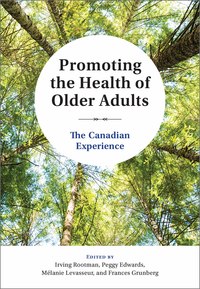Special to the Financial Independence Hub
As an everyday person taking a fast read of the title of the new book – Promoting the Health of Older Adults: The Canadian Experience – you wouldn’t exactly get the sense of what to be surprised by or expect what content would be covered within. In the first place, unfortunately, it’s not likely that this book will make it into the hands of everyday people any time soon.
You might ask, what are we promoting, what’s so specific for older adults – eat a nutritional diet of foods, exercise to stay fit, keep your brain active and get your proper sleep? Isn’t that what anyone through their life course should be doing? Yes, maybe. But that’s not at all exactly what you will get here.
Appreciating focus, as the writers in the preface state, the book’s main purpose is for knowledge building on issues related to older adults and their care, primarily for target audiences such as, “undergraduate and graduate students in gerontology and aging, health promotion… and other fields….” and the five groups identified include, educators, learners, policy makers, researchers and practitioners and leaders working with older adults in civic society organizations.
While that may sound too academic, after reading this book my belief is that the general public of everyday people, older adults and others younger, will also benefit greatly from an education presented here on this important subject. If you do flip through this 600-plus page tome, you might think of it at first as “insider dialogue” on health promotion; but not so fast, don’t put the book down.
Serving to heighten knowledge & awareness to engage in social health dialogue.
Choose as many words as you want; for me, Promoting the Health of Older Adults is a social health dialogue, inclusive for all Canadians – interconnected subject areas, holistic, comprehensive, diverse. The arrival of this book is timely, to promote conversation with friends and family, considering our collective journey through the COVID world to date has heightened our awareness of the workings of our own health and our social and healthcare systems.
Briefly, on the structure of this book; it certainly is more of a study text book on over thirty topic areas in seven well laid out parts. However nothing I’ve read talks over the heads of readers, and if facilitated well in a real time group discussion format, there is a set of critical thinking questions at the end of each chapter that would further serve to heighten knowledge and awareness of readers, enough to make you want to be a more engaged in this social health dialogue.
For those who may find some of the topics, concepts or terminology new or bamboozling (been looking for a place to use that word) – there is a clearly worded full glossary at the back of the book to help un-bamboozle you. As the book moves on, specific topics are covered on their own and can be read out of order, even though I find there is this inter-connectedness. However to get the right set up I recommend you read chapters 1 thru 5 in order first.
In particular, chapter 4 (Peggy Edwards, Jim Hamilton & Michael Routledge) discusses public policy for healthy ageing which is important now, given that public health policy in general has been at the forefront of discussion since COVID began in early 2020 and continues to be, sadly, an area where many people are in need of a re-education. To make a point on this, for instance on page 67, it is proposed that we need a new approach to improve population health, “… away from the focus on illness care systems.”
My intent is to highlight chapters of this book in future blog posts, which cover many topics I’ve featured in previous posts over the past ten years, plus others which have had less coverage. As up to date as any book on health can be, this one, detailing the Canadian Experience, also marks the beginning of the United Nations, Decade of Healthy Ageing 2021-2030.
Yet Promoting the Health of Older Adults, brings with it a sense of history, clearly showing that health promotion is not a sudden enlightenment, but maybe a social revival. As far back as 1986, there was the World Health Organization (WHO) – Ottawa Charter for Health Promotion from which this books uses its action framework as a guide, applying its focus on the health of older adults. A worthy read indeed, even for those who have their heads in this subject every day.
Mark Venning is a writer, speaker, researcher and advisor on the business, technology, health & social aspects of ageing and longevity which include changing concepts in a longevity society for Age Inclusive Communities. He is an Associate Member of the International Federation on Ageing.
This blog originally appeared on Aug. 31, 2021 and is republished here with his permission.



